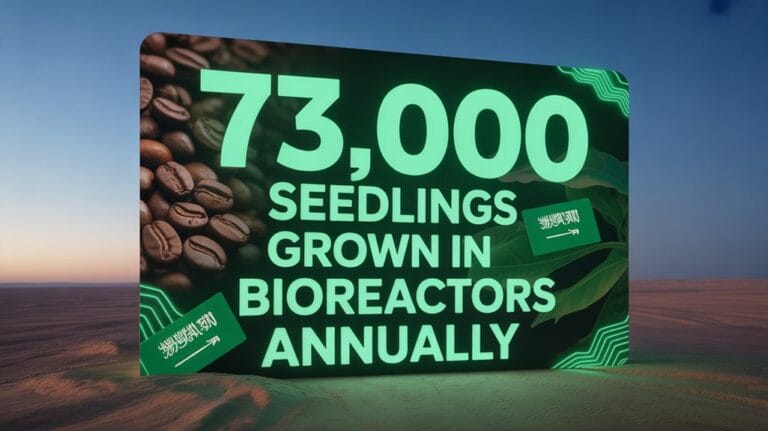Saudi Arabia is brewing a bold agricultural shift with plans to plant 50,000 coffee seedlings by 2025. This initiative, part of the Sustainable Agricultural Rural Development Program (Saudi Reef), aims to enhance coffee tree productivity by 30% while weaving modern agricultural technology into the nation’s coffee culture.
Partnering with the National Centre for Sustainable Agriculture Research and Development (Estidamah), the project combines high-tech methods with efforts to strengthen food security and diversify an economy long tied to oil.
Advanced tissue culture technology sits at the program’s core, generating uniform, high-quality seedlings. Scientists use somatic embryos from elite genetic samples to grow plants in bioreactors, which speed up growth and cut labor. In 2024 alone, over 73,000 seedlings—including 1,500 coffee plants—were produced. Nearly 1,200 have moved to greenhouses for acclimatization, with 400 undergoing “hardening” to prep for harsh desert conditions.
Saudi researchers employ tissue cultures and bioreactors to produce 73,000 resilient seedlings annually—including 1,500 coffee plants prepped for arid conditions through rigorous acclimatization.
Genetic research underpins the pursuit for resilient coffee strains. Researchers started with six top genetic samples from Jazan, Asir, and Baha, later narrowing 82 patterns into 12 distinct groups based on traits. The focus is on creating disease-resistant, drought-tolerant varieties. Over 1,000 seedlings from cuttings of the best genotypes are already traceable, ensuring quality control from farm to harvest.
Farmer training is key to scaling production. More than 109 growers have joined study trips to experimental fields and cooperatives, learning advanced techniques through hands-on workshops. Guides on agricultural practices and tech aim to empower rural communities, linking tradition with innovation.
Jazan, already producing 1,000 tonnes of coffee yearly across 2,000 farms, anchors regional efforts. Local beans like Khawlani coffee have earned recognition for their unique flavor profiles, positioning them as potential global contenders in specialty markets. The initiative complements broader Saudi Reef projects like beekeeping, fruit crops, and aquaculture, all part of a push to reshape farming models. Having benefited 87,000 participants across its eight strategic pillars, the program strengthens rural economies through diversified agricultural development. Elevating coffee output could also lift agriculture’s share of GDP.
Sustainability drives each step. Drought-tolerant varieties and efficient water use aim to make coffee farming viable in arid climates. By cutting imports and building local supply chains, Saudi Arabia hopes to brew a self-reliant future—one seedling at a time.



